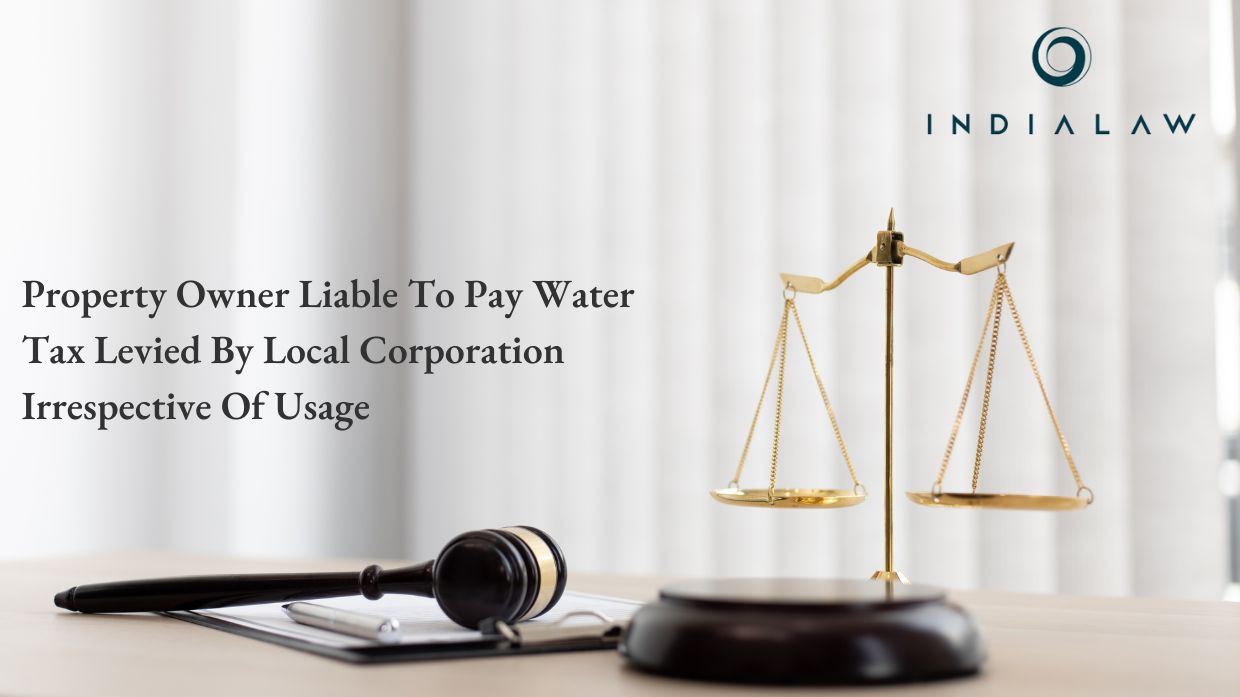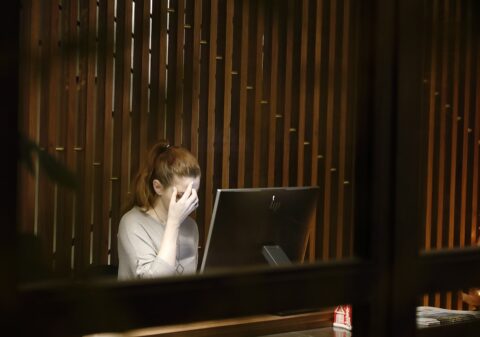Property Owner Liable To Pay Water Tax Levied By Local Corporation Irrespective Of Usage

In a pivotal ruling, the Hon’ble Bombay High Court (“HC”) held that property owners must pay water tax and water benefit tax even if the water facility is not utilized by either the owner or the occupier of the property. A full bench comprising of Atul Chandurkar, Manish Pitale and Sandeep Marne JJJ wherein MARS Enterprises and Oil (“Petitioner”) contested the Municipal Corporation of Greater Mumbai’s (“Municipal Corporation”) claim for water tax and water benefit tax under the Mumbai Municipal Corporation Act, 1888 (“said Act”), even though the water supply had been disconnected[i].
Upon observing differing opinions from Division Benches of the HC regarding the liability of owners or occupiers who do not use the water supplied by the Municipal Corporation to pay water tax and water benefit tax, the Ld. Single Judge (V. M. Kanade J.) referred the matter to a larger Bench by order dated 28th March 2007.
Facts of the Case:
The present Writ Petition No. 455/2005 was filed by MARS Enterprises, which undertook the redevelopment of a building located at 5 Battery Street, Gordon House, Behind Regal Theatre, Mumbai. The building was originally owned by Mr. Manu Narang and, following his death, passed to his heirs who operate under the name MARS Enterprises. A water connection was provided to the building prior to redevelopment. The petitioner requested disconnection of the water supply in a letter dated 9th June 1995, and the Municipal Corporation responded with a letter dated 4th November 1997 confirming the disconnection. During redevelopment, the petitioner used water tankers and, upon completion, applied for a new water connection.
Against this backdrop, the petitioner received a bill from the Municipal Corporation dated 6th February 2004, demanding a total property tax of Rs. 21,62,245/- (Rupees Twenty One Lakh Sixty Two Thousand Two hundred Forty Five Only), which included Rs. 8,77,042/- (Rupees Eight lakh Seventy Seven Thousand Forty Two Only) for water tax and Rs. 1,68,662/- (Rupees One Lakh Sixty Eight Thousand Six Hundred Sixty Two Only) for water benefit tax, along with sewerage tax. The petitioner challenged this bill and the order of the Investigating Officer dated 5th February 2004 in Writ Petition No. 455/2005, seeking to restrain the Municipal Corporation from recovering the water tax and sewerage tax. Although other issues were raised in the petition, the Ld. Single Judge noted in an order dated 28th March 2007 that the challenge to the property tax and sewerage tax was not pursued in this petition as the petitioner had filed an appeal under Section 217 of the MMC Act[ii] before the Small Causes Court. Consequently, the petitioner limited the challenge in Writ Petition No. 455/2005 solely to the demand for water tax. The petitioner contends that, since water was not consumed during the period of disconnection, they should not be liable for the water tax charged by the Municipal Corporation.
Another Writ Petition No. 589/2001 was filed by Oil and Natural Gas Corporation Ltd (“ONGC”) before the HC to contest a Notice of Demand dated 29th November 2000 and a warrant of attachment dated 26th February 2001. ONGC argues that water tax and sewerage tax should not have been imposed in the absence of actual water supply. ONGC owns land at ‘H’ Block, Bandra Kurla Complex, and had been paying property taxes to the Municipal Corporation, which did not include water or sewerage taxes. After submitting construction plans to the Municipal Corporation in 1998, ONGC received a bill on 29th November 2000, imposing a water tax of 130% and a sewerage tax of 70% of the rateable value of the plot. ONGC disputes these charges, stating that no water or sewerage connections were obtained for the plot.
The petition was admitted on 18th November 2002. When it was scheduled for final hearing on 25th November 2011, the Division Bench decided to defer the case until a decision was made on the reference to a larger Bench in Writ Petition No. 455/2005. When Writ Petition No. 589/2001 was considered alongside Writ Petition No. 455/2005, the Division Bench issued a common order on 17th March 2022, noting that it would be appropriate for the larger Bench to review the Supreme Court’s judgment in Harish Lamba[iii] and issue a relevant order on the reference. Hence, both the writ petitions have been referred to the larger bench of HC.
Issues:
The full bench has been referred to decide upon the following questions of law:
- Whether the Corporation has a power to levy tax under Section 140(a)(i) of the said Act on the actual supply of water?
- Whether the water benefit tax, as envisaged under Section 140(a)(ii) of the said Act, could be levied irrespective of the actual consumption of water since it pertains to maintenance of the system?
- Whether the Corporation is entitled to levy fixed tax apart from water charge which is levied for actual consumption of water?
Analysis:
Per section 140 of the said Act[iv] provides for levy of property taxes comprising of water tax, water benefit tax, sewerage tax, additional sewerage tax, general tax and education cess.
Section 140 of the said Act delineates two distinct components of property taxes related to water. According to Section 140(1)(a)(i), ‘water tax’ can be imposed at a percentage of the rateable value or capital value as determined by the Standing Committee, specifically for providing water supply. Section 141(1)(a)(ii) introduces an additional tax called ‘water benefit tax,’ which is also levied at a percentage of the rateable value or capital value as prescribed by the Standing Committee. The ‘water tax’ is charged for the provision of water supply services within the Municipal Corporation area, while the ‘water benefit tax’ covers the costs associated with the development, maintenance, and operation of the infrastructure necessary for water supply.
The HC opined that the first two questions formulated by the Ld. Single Judge for reference pertain to different types of water taxes. Question No. 1 addresses the ‘water tax’ under Section 140(1)(a)(i), whereas Question No. 2 concerns the ‘water benefit tax’ under Section 141(1)(a)(ii). As noted, ‘water tax’ is charged for providing water supply services, whereas ‘water benefit tax’ covers expenses related to the construction, improvement, and maintenance of water supply infrastructure. The Ld. Single Judge formulated these questions to reflect this distinction. Question No. 1 queries whether the Municipal Corporation can impose ‘water tax’ under Section 140(1)(a)(i) based on the actual supply of water. Question No. 2 inquires whether ‘water benefit tax’ under Section 141(1)(a)(ii) can be levied when there is no actual consumption of water, given that this tax is meant to address the costs of water supply infrastructure.
The Municipal Corporation is authorized to levy ‘water tax’ under Section 140(1)(a)(i) of the said Act as soon as the water supply facility is made available to the property owner or occupier, regardless of actual water consumption. Similarly, despite the distinct purpose of ‘water benefit tax,’ which is to cover the costs of installing, operating, and maintaining water supply infrastructure, it remains a component of property tax and should be levied on the same basis as ‘water tax.’ Therefore, Question No. 2 is answered by affirming that ‘water benefit tax’ under Section 140(1)(a)(ii) of the said Act can be imposed to cover the costs of water supply facilities, regardless of whether there is actual water consumption.
Under Section 169 of the said Act[v], ‘water charges,’ determined by measuring or estimating the quantity of water supplied, can only be levied ‘in lieu’ of water tax. The Hon’ble Supreme Court, in paragraph 21 of its judgment in Harish Lamba (supra), observed that the imposition of water charges under the Rules made pursuant to Section 169 of the said Act is meant to replace both water tax and water benefit tax. Thus, Section 169(1)(ii) of the said Act clearly indicates that water charges are a substitute for water tax. Therefore, once a property owner or occupier starts using the water supply facility and becomes subject to water charges under Section 169(1)(ii), these charges substitute for both water tax and water benefit tax. Thus, property taxes are compulsory imposition and the liability to pay water tax and water benefit tax accrues irrespective of consumption or otherwise of water in the premises. Therefore, the HC upheld the arguments of the Municipal Corporation that even without consumption the property owner is liable to pay the levied taxes.
Conclusion:
The HC addressed the implications of water charges under Section 169 of the said Act. It was clarified that water charges, determined based on the actual quantity of water supplied, are meant to replace both water tax and water benefit tax. This means that once a property owner or occupier is subject to water charges, they are not required to pay the separate water tax or water benefit tax. The judgment aligns with the Hon’ble Supreme Court’s clarification in Harish Lamba (supra), which confirmed that water charges are a substitute for both water tax and water benefit tax. This substitution emphasizes that the financial obligation for water services should be consolidated into water charges once actual consumption is measured. In authors’ opinion the ruling by the Hon’ble Bombay High Court provides clarity on municipal water tax obligations, affirming that taxes apply regardless of actual usage. While it may prompt disputes for unused facilities, the Hon’ble Supreme Court’s stance on water charges as a substitute offers a fair solution. This decision balances infrastructure funding with actual water use, streamlining tax responsibilities for both property owners and municipal authorities.
[i] MARS Enterprise v. Municipal Corporation of Greater Mumbai (WP/455/2005).
[ii] Appeals against Valuations and Taxes.
[217. (1) Subject to the provisions hereinafter contained, appeals against any rateable value [or the capital value, as the case may be,] or tax fixed or charged under this Act shall be heard and determined; by the Chief Judge of the Small Cause Court. (2) But no such appeal by the Chief Judge of the Small Cause Court, [shall be entertained] by the said Chief Judge, unless— (a) it is brought within [twenty-one days] after the accrual of the cause of complaint ; (b) in the case of an appeal against a rateable value [or the capital value, as the case may be,] a complaint has previously been made to the Commissioner under section 163, as such complaint has been disposed of ; (c) in the case of an appeal against any amendment made in the assessment book under section 167 during the official year, a complaint has been made by the person aggrieved within 1[twenty–one days] after the first received notice of such amendment, and his complaint has been disposed of ; (d) in the case of an appeal against a tax, or in the case of an appeal made against rateable value 2[or the capital value, as the case may be] 3[the amount of the disputed tax claimed the appellant, or the amount of the tax chargeable on the basis of the disputed rateable value 2[or the capital value, as the case may be] up to the date of filing of the appeal, has been deposited by the appellant with the Commissioner 4[and such appeal is accompanied by a receipt of the full amount of tax to which appeal relates]].
[(2A) Where the appeal is not filed in accordance with the provisions of clauses (a) to (d) of sub-section (2), it shall be liable to be dismissed.]
(3) In the case of any appeal entertained by the Chief Judge, but not heard by him, before the date of commencement of the Maharashtra Municipal Corporation (Amendment) Act, 1975, the Chief Judge shall not hear and decide such appeal, unless the amount of the dispute tax claimed from the appellant, or the amount of the tax chargeable on the basis of the disputed rateable value, as the case may be, up to the date of filling the appeal, has been deposited by the appellant with the Commissioner within thirty days from the date of publication of a general notice by the Commissioner in this behalf in the local newpapers. The Commissioner shall simultaneously serve on each appellant a notice under sections 484 and 485 and other relevant provisions of this Act, for intimating the amount to be deposited by the appellant with him.
(4) As far as possible, within fifteen days from the expiry of the period of thirty days prescribed under sub-section (3) the Commisioner shall intimate to the Chief Judge the names and other particulars of the appellants who have desposited with him the required amount within the precribed period and the names and other particulars of the appellants who have not deposited with him such amount within such period. On receipt of such intimation, the Chief Judge shall summarily dismiss the appeal of any appellant who has not deposited the required amount with the Commissioner within the prescribed period.
[(5) In the case of any appeal against any rateable value or property tax fixed or charged under this Act, which may have been entertained by Chief Judge before the commencement of the Act aforesaid, or which may be entertained by him after the said date, the Chief Judge shall not hear and decide such appeal unless the property tax, if any payable, on the basis of the original rateable value plus eighty per centum of the property tax claimed from the appellant on the increased portion of the rateable value of the property out of the property tax claimed under each of the bill, which may have been issued, from time to time, since the filling of appeal, is also deposited with the Commissioner within the period prescribed under the Act. In case of default by the appellant, on getting an intimation to that effect from the Commissioner, at any time before the appeal is decided, the Chief Judge shall summarily dismiss the appeal : Provided that, in case the appeal is decided in favour of the Corporation, interest at 6.25 per centum per annum shall be payable by the applicant on the balance amount of the property tax from the date on which the amount of property tax was payable : Provided further that, in case the appeal is decided in favour of the applicant and the amount of the property tax deposited with the Corporation is more than the property tax payable him, the Commissioner shall adjust the excess amount of the property tax with interest at 6.25 per centum per annum for the date on which the amount is deposited with the Corporation towards the property taxes payable thereafter.]]
[iii] Writ Petition No.1206/1999 decided on 21 November 2006.
[iv] 140. Property taxes leviable on rateable value, or on capital value, as the case may be, and at what rate.— (1) The following property taxes shall be leviable on buildings and lands in Brihan Mumbai, namely: (a)(i) the water tax of so many per centum of their rateable value, or their capital value, as the case may be, as the Standing Committee may consider necessary for providing water supply; (ii) an additional water tax which shall be called “the water benefit tax” of so many per centum of their rateable value, or their capital value, as the case may be, as the Standing Committee may consider necessary for meeting the whole or part of the expenditure incurred or to be incurred on capital works for making and improving the facilities of water supply and for maintaining and operating such works: Provided that all or any of the property taxes may be imposed on a graduated scale. (b)(i) the sewerage tax of so many per centum of their rateable value, or their capital value, as the case may be, as the Standing Committee may consider necessary for collection, removal and disposal of human waste and other wastes; (ii) an additional sewerage tax which shall be called the “sewerage benefit tax” of so many per centum of their rateable value, or their capital value, as the case may be, as the Standing Committee may consider necessary for meeting the whole or a part of the expenditure incurred or to be incurred on capital works for making and improving facilities for the collection, removal and disposal of human waste and other wastes and for maintaining and operating such works;
General tax (c) a general tax of not less than eight and not more than fifty per centum of their rateable value, or of not less than 0.1 and not more than 1 per centum of their capital value, as the case may be, together with not less than one-eighth and not more than five per centum of their rateable value or not less than 0.01 and not more than 0.2 per centum of their capital value, as the case may be, added thereto in order to provide for the expense necessary for fulfilling the duties of the corporation arising under clause (k) of Section 61 and Chapter XIV: Provided that, the Corporation shall not levy property tax leviable under this clause, on residential buildings or residential tenements, having carpet area of 46.45 sq m (500 sq ft) or less.
Explanation.— For the purposes of the above proviso, the term “residential buildings or residential tenements, having carpet area of 46.45 sq m (500 sq ft) or less” means the residential buildings or residential tenements, existing on the date of coming into force of the Mumbai Municipal Corporation (Amendment) Act, 2019, having carpet area of 46.45 sq m (500 sq ft) or less and recorded with such area in the municipal records on 1-1-2019 or in respect of which the permission to occupy has been granted by the Corporation permitting such area to be occupied after such date of coming into force of the said Act. Education cess (ca) the education cess leviable under Section 195-E; (cb) the street tax leviable under Section 195-G. (d) betterment charges leviable under Chapter XII-A. (2) Any reference in this Act or in any instrument to a water tax or a halalkhor tax shall after the commencement of the Bombay Municipal Corporation (Amendment) Ordinance, 1973, be construed as a reference to the water tax or the water benefit tax or both, or the sewerage tax or the sewerage benefit tax, or both as the context may require.
[v] 169. Rules for water taxes and charges.
(1) Notwithstanding anything contained in section 128, the [Standing Committee] shall, from time to time, make such rules as shall be necessary for supply of water and for charging for the supply of water and for any fittings, fixtures or services rendered by the Corporation under Chapter X and shall by such rules determine (i) the charges for the supply of water by a water tax and a water benefit tax levied under section 140 of a percentage of the rateable value or the capital value, as the case may be, of any property provided with a supply of water; or (ii) a water charge in lieu of a water tax, based on a measurement or estimated measurement of the quantity of water supplied; or (iii) combined charges under clauses (i) and (ii); or (iv) a compounded charge in lieu of charges under clauses (i) and (ii).
(2) A person who is charged for supply of water under clause (ii) or (iv) of subsection (1) shall not be liable for payment of the water tax, but any sum payable by him and not paid when it becomes due shall be recoverable by the Commissioner as if it were an arrear of property tax due.
(3) Notwithstanding anything contained in section 146, the water taxes and charges shall be primarily recoverable from person or persons actually occupying the premises.
By entering the email address you agree to our Privacy Policy.



